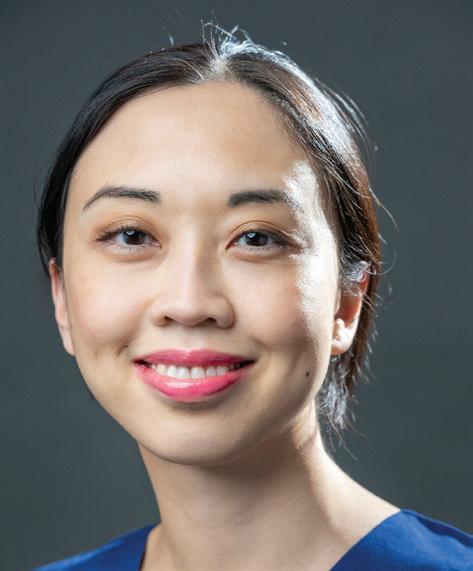
9 minute read
Triple Negative Breast Cancer – a different shade of pink
With Breast Surgeon Dr Mary Ling
What is triple negative breast cancer? Triple negative breast cancer (TNBC) is a type of breast cancer that does not have any of the 3 receptors commonly found on breast cancer cells – the oestrogen, progesterone and HER2 receptors. Receptors are molecules on the surface of cancer cells, which interact with specific proteins and hormones that allow the cancer to grow and spread.
TNBCs are not fuelled by hormones oestrogen and progesterone or the HER2 protein, therefore they do not respond to endocrine (hormonal) therapy (e.g. Tamoxifen) or targeted therapy aimed at HER2 receptors (e.g Herceptin). However they generally respond to chemotherapy.
TNBCs account for 10-20% of all breast cancers.
What are the risk factors? Anyone can be diagnosed with TNBC, but known risk factors include: Younger Age: premenopausal women are more likely to be diagnosed. Ethnicity: black and Hispanic women are more likely to be diagnosed compared with Asian and non-
Hispanic white women. Gene Mutation: women with BRCA1 gene mutations are more likely to develop TNBC. Approximately 75% of breast cancers diagnosed in people with a BRCA1 mutation are triple negative.
How is TNBC different? TNBC is considered more aggressive and has a poorer prognosis than other types of breast cancer. It is more likely to spread beyond the breast and more likely to recur after treatment. Metastasis is more likely to internal organs, brain and spinal cord and lungs (and less likely to bones).
TNBC also tends to be higher grade than other types of breast cancers. The higher the grade, the less the cancer cells resemble normal healthy breast cells.
TNBCs have a higher likelihood of being found as interval cancers, which are cancers diagnosed between screening mammograms.
What is the treatment for triple negative breast cancer? The mainstay of treatment for early stage TNBC is neoadjuvant chemotherapy followed by surgery. Radiotherapy may also be required.
Research has shown that when TNBC is treated with chemotherapy before surgery (neoadjuvant chemotherapy) and there are no active cancer cells left in the tissue removed during surgery, survival is better.
Women diagnosed with TNBC, especially under the age of 50 years, should be referred for genetic counselling and testing.
What is the prognosis? The prognosis of TNBC depends on the stage of the cancer at diagnosis.
Generally, TNBCs have a poorer prognosis than other breast cancers, but new treatments are showing encouraging results.
TNBCs have a higher rate of recurrence than other breast cancers, with most of the recurrence detected in the 5 years after the initial diagnosis. BUT, in the longer term, the risk of recurrence may be lower compared with hormone receptor positive breast cancer.

Dr Mary Ling
Specialist Breast Surgeon
Rapid Access Appointments within 48 hours for patients with new diagnosis of breast cancer
Suite 6/16 Hills Street, Gosford & 4321 0302 www.drmaryling.com.au
and make a difference in 2021
Australians with low internet skills can often feel isolated from their community and family at a time in their lives when feeling connected is increasingly important.
The Be Connected Network is managed by Good Things Foundation and is part of the wider Be Connected initiative. Be Connected is an Australian government initiative committed to increasing the confidence, skills and online safety of older Australians. Be Connected aims to empower everyone to use the internet and everyday technology to thrive in our digital world. www.beconnected.esafety.gov.au
Through the Be Connected online resources, Australians can learn the basics of using digital devices and engaging with the internet, including: How to connect Staying safe online Talking to or seeing family and friends who live far away Keeping up to date with what’s happening in communities and around the world Shopping, banking and selling online, safely and securely Accessing government services online Watching movies, listening to music and reading books.
As a local Be Connected Network Partner, the Central Coast Community College is committed to digital inclusion and supporting older Australians bridge the digital divide. Through our Digital Connect program we deliver free digital literacy workshops, both face to face and online. Every Monday morning at 10:30am dozens of seniors across the coast join the college team for a 90 minute workshop and question answer session, run online via Zoom. If you would like more information or to register, see our website at cccc.nsw.edu. au/digital-connect.
Do you love helping your friends and family use the internet and digital technology? If so it sounds like you would make a great Digital Mentor!
A National Seniors Australia Report has shown that seniors who are thriving in the digital age make perfect teachers for those struggling in the online world. Through Digital Connect, the college trains and supports a wonderful team of Digital Mentors who are focussed on providing one-to-one assistance.
Our Free Digital Mentor course will help you develop the skills and confidence you need to support people one-to-one. You will learn about the language and techniques needed and the possible barriers that people who are new to digital technology and the internet can experience.
The course can be done over one day or in two x 3-hour sessions and either face to face at our Ourimbah campus or online vias Zoom.

We are currently accepting enrolments, so with limited spaces available, head to the Central Coast Community College website for more information or to enrol. cccc.nsw.edu.au/digital-mentor
Stephen King Digital Connect Program Manager Email: digitalconnect@cccc.nsw.edu.au
Limited spaces are available so for more information or to register head to the Central Coast Community College website. cccc.nsw.edu.au/digital-mentor


Retirement villageor aged care?
Throughout our lives we make choices about where to live, largely driven by lifestyle, work or family. However, as we get older our health or increasing levels of frailty may have a greater impact on these choices.
Homes come in a variety of shapes, styles and legal structures. Planning ahead and researching options can help you to make a well-informed decision when you think you need to move.
Where we live in our older years is not just a decision about physical location but how we can access care and support. It is important to understand what is affordable as well as how your daily routine can be managed.

Accommodation versus care When care is needed, many people compare the option of a retirement village against residential aged care. While both provide supportive environments for older people, they are not complete substitutes. The funding and care implications are quite different.
Don’t view the comparison as just a property transaction based on price and size. For example, in a retirement village you may have access to a whole unit or villa, while for a similar price in a residential aged care service, you have only a single room. You should also
Opening hours
Monday to Friday 9am-4pm & first Saturday of every month 9am-12pm
We are specialists in fitting as well as providing comfort and orthopaedic footwear. We provide footwear for difficult to fit feet ~ in particular people with diabetes, arthritis, swelling and bunions as examples. We also provide a home visiting service and shoe modifications and repairs.
Off street parking & disabled access available 17 Cary Street Wyoming 4323 7515
a large range of styles, widths & colours available
RETIREMENT VILLAGE RESIDENTIAL CARE
Entry cost (accommodation) Set by the operator and specified in the contract. Usually a lump sum “purchase” but some villages may allow a rental arrangement.
Tenancy right Occupancy usually under a lease or licence arrangement.
Centrelink/ DVA means-test Homeowner status depends on the amount paid. If determined to be a homeowner, the entry amount paid is exempt.
Options when leave Depends on contract. If the unit is sold you may or may not share in any capital gains. A deferred management fee and refurbishment expenses are generally deducted from the refunded amount.
Cost of care Optional services provided at the operator’s discretion – with commercial and nonsubsidised pricing. A published price which you can choose to pay as a fully refundable lump sum or a daily “rental” amount.
Permanent tenancy for life, with rules for future moves specified in the agreement.
If a homeowner before moving, this status continues while a spouse continues to live there, or otherwise for the first two years only (or until home is sold).
A lump sum paid for the room (less any fees deducted) is refunded. All other rights terminate.
Rules for calculating fees are set by the government based on means-testing, with minimum and maximum annual fees.
think about how much support you need each day.
Retirement villages versus residential care Retirement villages offer the opportunity to live in a community of older people. The village operator will maintain the external building and community garden areas, but it is still independent living. For an additional cost, you may be able to access support inside your home but services vary from one retirement village to the next, and unless provided through a Home Care package, costs are not subsidised by the Government.
Residential aged care bundles fully supported living and care together with accommodation. This care is provided 24/7 and the costs are heavily subsidised by the government. The table on the left provides a basic summary of some of the key comparisons:
The value of advice Pulling together the information you need to make choices can be difficult and stressful for you and your family. Emotions can run high.
Giving yourself time by starting your research early can reduce stress levels and for an older person, can ensure their voice is heard more clearly. Call us today on 02 43250884 for advice to guide you through the process and help to create effective solutions for you and your family.
Sophie Doyle (AR#000470612) is an Aged Care Specialist at Morgans Financial Limited (Morgans AFSL 235410 / ABN49 010 669 726); she has a passion for assisting people make informed financial decisions, as they navigate their way through the aged care system. Disclaimer: The information in this article is general advice only and does not take into account your particular circumstances. We recommend specific tax or legal advice be sought before any action is taken and refer to the relevant Product Disclosure Statement before investing in any product. Current at 1 December 2020.
Will you have to sell the house?
Understand the financial implications and opportunities available when transitioning a loved one into Aged Care. We can guide you through the financial steps. Ask today!

Sophie Doyle AR 000470612 Aged Care Specialist /Associate Adviser
02 4325 0884 | morgans.com.au/gosford/aged-care
Morgans Financial Limited ABN 49 010 669 726 AFSL 235410 A Participant of ASX Group A Professional Partner of the Financial Planning Association of Australia.








